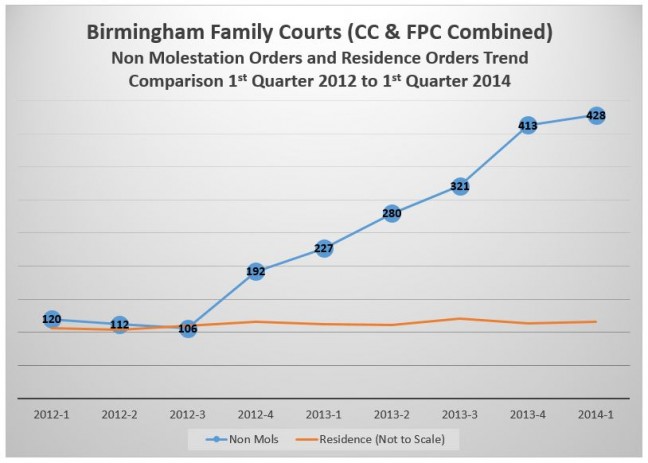Our Parental Responsibility and Education guide has been updated to include download links to Government guidance for schools on parental responsibility and the school’s duty in relation to liaison with parents which was amended earlier this year.

Our Parental Responsibility and Education guide has been updated to include download links to Government guidance for schools on parental responsibility and the school’s duty in relation to liaison with parents which was amended earlier this year.

Last weekend I spoke at a charity event on common failings in intractable contact disputes. Inevitably, the question arose about thoughts on the judicial led consultation on McKenzie Friends. What were my thoughts?
For those unaware, there is a consultation underway to look at whether McKenzie Friends should be regulated, insured and paid. Continue reading The McKenzie Friend Issue

It probably hasn’t escaped you that nearly a fifth of courts and tribunals are to close. If you were wondering whether courts you attend will be among the 86 closures announced this week, the ones which will close are listed below by region. Continue reading Is Your Local Court Closing?

Last year we ran a series of articles on the dramatic increase in applications for non-molestation orders since legal aid cuts were introduced in 2013.
The Daily Mail has picked up on the troubling data coming from Her Majesty’s Courts and Tribunal Service.
The headline runs “Huge rise in divorce claims alleging violence after legal aid was axed except in cases involving abuse.“ Continue reading Daily Mail: Huge Rise in DV Claims after Legal Aid Cuts

“Deborah Eaton QC and Stephen Jarmain, barrister, both of 1 King’s Bench Walk, explain the lessons to be learned from the important Court of Appeal judgment on internal relocation in which the authors represented the mother.”
A must read for anyone who becomes involved in cases involving internal relocation. Add it to your bookmarks!

A few days ago I shared an update that the President of the Family Court has announced the production of draft family law orders better suited to Litigants-in-Person (parents who represent themselves in court). The intentions are positive and include better consistency across the court service and wording aimed at the non-technical.
Hopefully the new judicial templates will cut down on some of the poor practice we see, including filing dates being left off directions, and warning notices being omitted (despite their inclusion being a statutory requirement).
The President, in his announcement, seeks to address the resistance which exists to change, which included complaints that previous draft court orders issued in early 2014 were apparently too difficult for some to use. Others complained that the standard drafts were too long. As mentioned above, trusting people to include the right wording in orders is fine in theory, but in practice this resulted in mistakes being made and omissions. To help ease in the change, the President has also had prepared a tick list of potential order wording which allows a judge/court staff to quickly select the wording they wish included in the order.
The President’s announcement does miss something though. It’s not uncommon for McKenzie Friends to be asked to draft court orders. Where the judge regularly sees the McKenzie Friend in court, and is confident in their ability, this happens sometimes even when the other party is represented (yes, really!).
All well and good to make the draft order wording available within the court service, and widening publication to the Bar and Law Society, but what about McKenzie Friends?
This is where we step in. The draft order wording is now available within our Draft Court Orders section of our Family Law App. The ‘tick list’ wording can be downloaded as a PDF and is also available via the link picture below:

F (Children) [2015] EWCA Civ 1315 is yet another case involving alienation where the handling of the case by the lower court was ‘wholly inadequate‘. Not my opinion (actually it is, and I agree…), but that of the Lords Justice who heard the appeal.
The case highlights the failings which are increasingly commonplace in the lower courts. The child has been poisoned by one parent against the other yet the court grants excessive weight to the child’s wishes and feelings at the cost of their welfare needs, and fails to address the issue of the alienating parent’s behaviour. The child is left subject to continued emotional abuse and the parent who sought the court’s help is utterly failed. Months elapse due to the court’s failure to get a grip and problems become entrenched. Continue reading Judicial Judgment ‘Wholly Lacking’ in Intractable Contact Cases

It is common in the family law arena/charity sector to get requests from the media or from students undertaking PhDs, asking for contact details for people who have been involved in family law proceedings for the purpose of news stories or research.
On the whole, we do not involve ourselves with passing on details of people who have been involved in court proceedings. Exceptions are if: Continue reading Research and Media Requests – Things to Ponder

Yesterday yet another piece of research hit the headlines supporting that post-separation shared parenting better supports child welfare and child mental health when compared to sole-residence arrangements. The Swedish study looked at the experiences of 4,684 children and concluded that children do better psychologically when post-separation residence arrangements are shared, and both parents substantively involved in their children’s upbringing. Continue reading Shared Parenting Policy – Leaving it to the Wombles

The case related to an application for leave to remove in respect of two teenagers. One being under 16, the other aged 17. The appellate court refused appeal against the recorder´s decision to refuse leave to remove in respect of the younger teen, despite their expressing their wish to relocate. The underlying reason was that the mother´s plans for the relocation were not sufficiently thought through. In respect of the older child, appeal was allowed, as “The simple fact is that E is too old to be directed by the court in a matter of this kind.” Continue reading Re C (Older Children: Relocation) [2015] EWCA Civ 1298